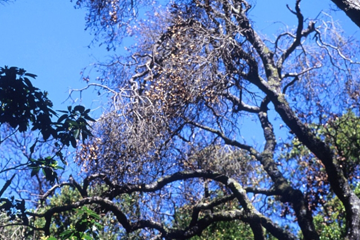The Indiana Department of Natural Resources (DNR) confirmed more than 70 Walmart stores and 18 Rural King stores in the state have received rhododendron plants infected with sudden oak death (SOD), a fungal pathogen that kills oak trees. Shipments containing infested material were sent to nine other states as well.
Workers from the Department of Entomology & Plant Pathology have been visiting stores across Indiana to destroy any stock that has been found infested and quarantine any stock that is symptomatic. The division has made this its top priority.
The DNR has destroyed approximately 1,500 infested rhododendron so far and pulled another 1,500 from stores. The DNR has also ordered these stores to stop selling rhododendron until further notice. Any quarantined material not infected will be released following testing at Purdue University.
The DNR is also following up with homeowners that have called in to say they’ve purchased material that they believe is infested or are seeing signs/ symptoms of sick trees in the environment.
SOD has killed large tracts of oaks on the West Coast. SOD has not been established in the Midwest, to date. SOD can kill standing oak trees, which could happen if SOD-positive rhododendron were planted within about 6 feet of a standing oak.
SOD travels in more than a hundred species of host plant material. It causes some browning of the leaves in the host but does not kill it. For a list of those plants see the following https://www.aphis.usda.gov/plant_health/plant_pest_info/pram/downloads/pdf_files/usdaprlist.pdf
If you have purchased rhododendrons in the last four weeks from Walmart or Rural King, destroy them, or call 1-866-NO-EXOTIC (663-9684) or the local county extension office at 1-888-EXT-INFO (1-888-398-4636) for instructions.
This is an ongoing investigation, and guidance could change as more information is gathered.
To learn more about SOD, see: https://www.aphis.usda.gov/aphis/ourfocus/planthealth/plant-pest-and-disease-programs/pests-and-diseases/phytophthora-ramorum/sod.
ORIGINAL RELEASE - MAY 22, 2019
The Indiana DNR confirmed today that it has intercepted plants containing a fungal pathogen that kills oak trees, sudden oak death (SOD), for the first time in about 10 years.
Inspectors from the DNR Division of Entomology & Plant Pathology detected SOD (Phytophthora ramorum) in several varieties of rhododendrons being sold in Columbus, Noblesville, South Bend, Sullivan and Tippecanoe.
SOD has killed large tracts of oaks on the West Coast. SOD has not been established in the Midwest, to date. SOD can kill standing oak trees, which could happen if SOD-positive rhododendrons were planted within about 6 feet of a standing oak.
SOD travels in more than a hundred species of host plant material. It causes some browning of the leaves in the host but does not kill it. For a list of those plants see the following https://www.aphis.usda.gov/plant_health/plant_pest_info/pram/downloads/pdf_files/usdaprlist.pdf
If you have purchased rhododendrons in the last four weeks in these communities, call 1-866-NO-EXOTIC (663-9684) or call the local county extension office at 1-888-EXT-INFO (1-888-398-4636) for instructions.
The DNR is destroying all rhododendrons from the source nursery, Park Hill Plants (Oklahoma), and any other host plants that were co-mingled with them. In addition, the DNR is quarantining the sale of four other common SOD host plants (viburnum, azalea, cameilia, and pieris) for further testing to determine if they contain SOD. Testing will determine if other species are infested and require destruction.
This is an ongoing investigation, and guidance could change as more information is gathered.
To learn more about SOD, see: https://www.aphis.usda.gov/aphis/ourfocus/planthealth/plant-pest-and-disease-programs/pests-and-diseases/phytophthora-ramorum/sod







